New funding secured to launch a 'repair café' at UWE Bristol's School of Engineering

Engineering students from the University of the West of England (UWE Bristol) will open a ‘repair café’ at the University’s Frenchay Campus this year, thanks to funding from the Royal Academy of Engineering.
The MAKERS project - Making And Knowledge Exchange for Repair and Sustainability - will aim to improve representation and belonging in engineering for women and people from Black, Asian or Minority Ethnic groups, alongside those from underrepresented backgrounds.
The students will work closely with local community groups in Easton, Eastville and St Paul’s - drawing on their experiences of establishing successful repair cafés in their areas - with the aim of opening a café in the University’s School of Engineering in October 2023.
Working alongside these community members, sharing and exchanging skills, and using UWE Bristol’s engineering equipment, the project will create a student community of repair and make links to the wider Bristol community repair movement. They’ll help solve problems and fix broken goods, upskilling those involved in the scheme and supporting the circular economy. The repair café will run until May 2024 and will build on previous UWE Bristol STEM partnership projects in the city.
Dr Laura Fogg-Rogers, UWE Bristol Associate Professor for Engineering in Society, said: “We’re looking forward to launching the MAKERS project with communities in Bristol, thanks to the funding from the Royal Academy of Engineering. Every year, we throw away huge amounts, even items which have very little wrong with them, which could easily be used again after a simple repair.
“As well as being better for the environment and promoting sustainability, this scheme will save people money, share repair skills that are being lost, and bring the local community together.
“For UWE Bristol, it offers our diverse engineering students the opportunity to add value to the area by working together in a purposeful and practical environment and to develop peer support and friendship. They will gain practical skills and informal mentoring by working alongside inter-generational community members, recruited through Bristol Repair Café network and industry STEM Ambassadors.”
The Royal Academy of Engineering awarded nearly £90,000 to the project from its Diversity Impact Programme, which aims to inspire change within university engineering departments. The programme provides funding for schemes that transform the experiences of engineering students from diverse and underrepresented backgrounds.
Kat Corbett is a volunteer at the repair café at The Old Library in Eastville. She said: “We are delighted to be part of the MAKERS project, which not only addresses the climate crisis, but also the lack of diversity in engineering. Our monthly Repair Café has become well established since we first set it up early in 2022, showing that there was a real demand for it: people do not only come to get their items fixed (many of which have a very sentimental value), but also to learn new repair skills, or simply enjoy a cup of tea in the café whilst waiting for their turn. Our repairers have also formed a real community and regularly support each other with the repairs. There is immense social and environmental value in the Repair Café movement, and we are excited to be working with UWE Bristol to help grow it further.”
The UWE Bristol engineering students will also be working with Baggator in Easton. Stuart Phelps, Chair of Trustees, added: "This is a brilliant opportunity to share skills, build links, and repair things people value. At a time when so many of our friends and neighbours are struggling to make ends meet, MAKERS will help them by giving new life to valued things; make new friendships between the University and Easton; and remove things from landfill. A real, living, example of the circular economy where it’s needed most."
The UWE Bristol MAKERS project is designed to give the students an increased sense of belonging and for them to grow more passionate about pursuing an engineering career.
Women make up only 16% of engineers, and those from minority backgrounds make up only 7% of engineers in employment (Engineering UK, 2020). Research indicates being part of a minority may mean students feel out of place, isolated, or unable to reveal or fulfil their complete identity [1]–[5] - resulting in lower recruitment rates, degree non-completion, lower salaries, and ultimately higher rates of leaving engineering [6], [7].
STEM activities which draw on wider societal or environmental purpose (communal goals) are more attractive to women [8]–[12]. Maker projects have been shown to improve identity and agency in STEM for black men and encourage engagement for other minorities [13]–[15]. This sits alongside the Climate and Ecological Emergency, with our students indicating a desire to make a difference locally e.g. through our Enactus and Engineers without Borders societies [16]. Furthermore, the COVID-19 pandemic has isolated all students with a resulting rise in mental health issues. Communal creative activities generate a psychological state of ‘flow’, which has therapeutic benefits to alleviate mental health issues[17]–[19].
References:
[1] L. Archer, J. Dewitt, J. Osborne, J. Dillon, B. Willis, and B. Wong, “‘Doing’ science versus ‘being’ a scientist: Examining 10/11-year-old schoolchildren’s constructions of science through the lens of identity,” Science Education, 2010, doi: 10.1002/sce.20399.
[2] L. Archer, J. DeWitt, J. Osborne, J. Dillon, B. Willis, and B. Wong, “‘Not girly, not sexy, not glamorous’: primary school girls’ and parents’ constructions of science aspirations 1,” Pedagogy, Culture & Society, vol. 21, pp. 171–194, 2013, doi: 10.1080/14681366.2012.748676.
[3] L. Archer, J. DeWitt, J. Osborne, J. Dillon, B. Willis, and B. Wong, “‘Balancing acts’’’: Elementary school girls’ negotiations of femininity, achievement, and science,’” Science Education, vol. 96, pp. 967–989, 2012, doi: 10.1002/sce.21031.
[4] E. Dawson, “‘Not Designed for Us’: How Science Museums and Science Centers Socially Exclude Low-Income, Minority Ethnic Groups,” Science Education, 2014, doi: 10.1002/sce.21133.
[5] E. Dawson, “Reimagining publics and (non) participation: Exploring exclusion from science communication through the experiences of low-income, minority ethnic groups,” Public Understanding of Science, 2018, doi: 10.1177/0963662517750072.
[6] R. Singh, N. A. Fouad, M. E. Fitzpatrick, J. P. Liu, K. J. Cappaert, and C. Figuereido, “Stemming the tide: Predicting women engineers’ intentions to leave,” Journal of Vocational Behavior, vol. 83, no. 3, pp. 281–294, Dec. 2013, doi: http://dx.doi.org/10.1016/j.jvb.2013.05.007.
[7] J. P. Concannon and L. H. Barrow, “A cross-sectional study of engineering students’ self-efficacy by gender, ethnicity, year, and transfer status,” Journal of Science Education and Technology, vol. 18, pp. 163–172, 2009, doi: 10.1007/s10956-008-9141-3.
[8] A. L. Belanger, M. P. Joshi, M. A. Fuesting, E. S. Weisgram, H. M. Claypool, and A. B. Diekman, “Putting Belonging in Context: Communal Affordances Signal Belonging in STEM,” Personality and Social Psychology Bulletin, 2020, doi: 10.1177/0146167219897181.
[9] M. A. Fuesting and A. B. Diekman, “Not By Success Alone: Role Models Provide Pathways to Communal Opportunities in STEM,” Personality and Social Psychology Bulletin, 2017, doi: 10.1177/0146167216678857.
[10] A. L. Belanger, A. B. Diekman, and M. Steinberg, “Leveraging communal experiences in the curriculum: Increasing interest in pursuing engineering by changing stereotypic expectations,” Journal of Applied Social Psychology, 2017, doi: 10.1111/jasp.12438.
[11] A. B. Diekman, E. S. Weisgram, and A. L. Belanger, “New routes to recruiting and retaining women in STEM: Policy implications of a communal goal congruity perspective,” Social Issues and Policy Review, 2015, doi: 10.1111/sipr.12010.
[12] A. B. Diekman, M. Steinberg, E. R. Brown, A. L. Belanger, and E. K. Clark, “A Goal Congruity Model of Role Entry, Engagement, and Exit: Understanding Communal Goal Processes in STEM Gender Gaps,” Personality and Social Psychology Review, 2017, doi: 10.1177/1088868316642141.
[13] M. L. Greene, B. C. Coley, and N. N. Kellam, “Black men in the making: Engaging in makerspaces promotes agency and identity for black males in engineering,” CoNECD 2019 - Collaborative Network for Engineering and Computing Diversity, 2019.
[14] S. Smith, K. Talley, A. Ortiz, and V. Sriraman, “The Engineering Education Maker Identity Project: Process and Tools as Boundary Objects within Cross-Disciplinary Collaboration,” in Proceedings of Society for Information Technology & Teacher Education International Conference 2017, Mar. 2017, pp. 1365–1371. [Online]. Available: https://www.learntechlib.org/p/177907
[15] K. G. Talley, A. M. Ortiz, V. Sriraman, and S. F. Smith, “The engineering education maker identity project: A look at the first year,” ASEE Annual Conference and Exposition, Conference Proceedings, vol. 2017-June, 2017.
[16] L. Fogg-Rogers, L., Richardson, D., Bakthavatchaalam, V., Yeomans, N. Algosaibi, M. Lamere, and W. Fowles-Sweet, “Educating engineers to contribute to a regional goal of net zero carbon emissions by 2030.,” 2021. [Online]. Available: https://uwe-repository.worktribe.com/output/7581094
[17] S. Buetow, A. Talmage, C. McCann, L. Fogg, and S. C. Purdy, “Conceptualising how group singing may enhance quality of life with Parkinson’s disease.,” Disability and Rehabilitation, 2013.
[18] S. Weiner, M. Lande, and S. S. Jordan, “Making identities: Understanding the factors that lead young adults to identify with the maker movement,” ASEE Annual Conference and Exposition, Conference Proceedings, vol. 2017-June, 2017, doi: 10.18260/1-2--28642.
[19] A. S. Masters, “How making and maker spaces have contributed to diversity & inclusion in engineering: A [non-traditional] literature review,” CoNECD 2018 - Collaborative Network for Engineering and Computing Diversity Conference, 2018.
Related news

15 December 2025
UWE Bristol rises eleven places in People & Planet University League
UWE Bristol has risen to 14th in the People & Planet University League (UK), a jump of eleven places.

12 December 2025
UWE Bristol’s environmentally conscious and student-focused accommodation wins three awards
Purdown View, the world's largest certified Passivhaus student accommodation development, has been recognised at Property Week Student Accommodation Awards.

20 November 2025
UWE Bristol ranked among top 12 per cent of universities globally for sustainability
UWE Bristol has climbed over 400 places in the QS World University Sustainability Rankings 2026, which evaluates universities on a range of environmental and social impacts.

06 November 2025
UWE Bristol welcomes West of England Mayor for annual Green Week
Helen Godwin, Mayor of the West of England, visited UWE Bristol during its annual Green Week to see the sustainability-driven research, innovation and skills initiatives that are helping to power the growth of the region’s green economy.
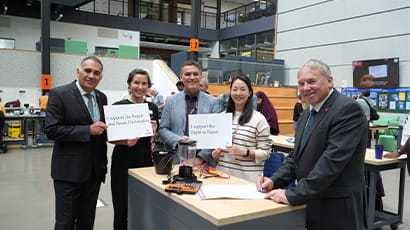
16 October 2025
UWE Bristol signs Repair and Reuse Declaration in commitment to sustainable initiatives
UWE Bristol is the first UK university to sign the Repair and Reuse Declaration as a whole institution, a call to legislators and decision makers to tackle climate change through greater repair and reuse support.

15 October 2025
UK food needs radical transformation on scale not seen since Second World War, new report finds
A new report from the Agri-Food for Net Zero Network+ finds urgent action on food is needed if the UK is to reboot its flagging economy, save the NHS billions, ensure national food security, and meet climate commitments.
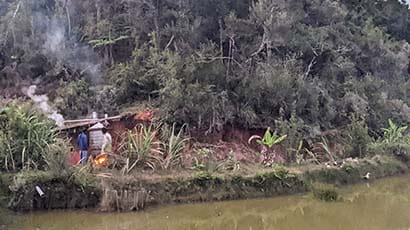
24 September 2025
UWE Bristol to help protect threatened forest in Madagascar in £800k project
UWE Bristol is a partner in a groundbreaking project awarded almost £800,000 in funding to protect one of Madagascar’s most precious and threatened forests.
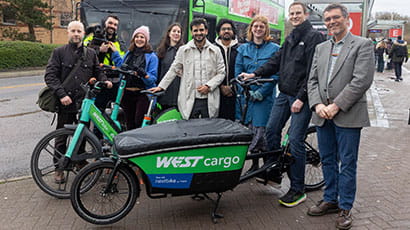
24 February 2025
WESTbusStop+ makes sustainable travel more convenient
A new WESTbusStop+ bringing together buses and other ways to travel has been officially opened at UWE Bristol’s Frenchay campus.
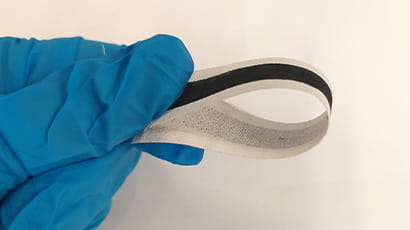
03 January 2025
Big leap forward for environmentally friendly ‘e-textiles’ technology
Research led by UWE Bristol and the University of Southampton has shown wearable electronic textiles (e-textiles) can be both sustainable and biodegradable.
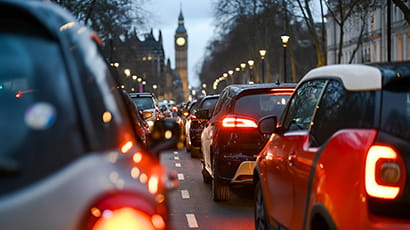
28 November 2024
Work of UWE Bristol academics features in Government report on air quality measurement
Two UWE Bristol academics have made contributions to an influential Government report on the measurement of air pollution.
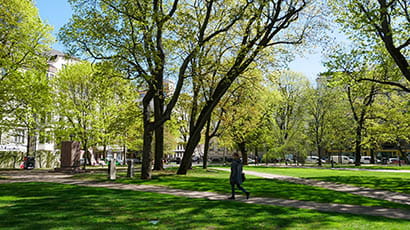
27 November 2024
Traffic noise reduces the stress-relieving benefits of listening to nature, study finds
Road traffic noise reduces the wellbeing benefits associated with spending time listening to nature, researchers have discovered.
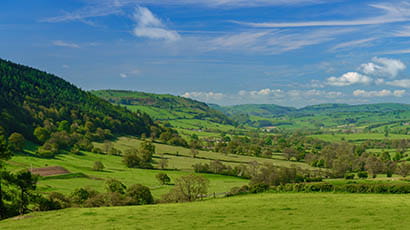
15 November 2024
Grasslands project led by UWE Bristol academic to support UK’s bid for net zero emissions
A UWE Bristol researcher will lead a £4.7 million project focused on the management of UK’s grasslands aimed at supporting efforts to achieve net zero emissions by 2050.






